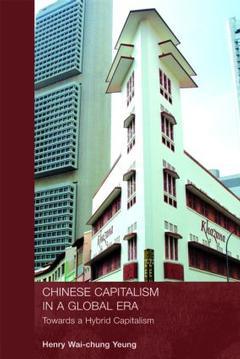Chinese Capitalism in a Global Era Towards a Hybrid Capitalism Routledge Advances in International Political Economy Series
Auteur : Yeung Henry Wai-chung

Chinese Capitalism in a Global Era examines the dynamic ways in which millions of ethinic Chinese in East and Southeast Asian economies organize their economic activities. It analyses how Chinese capitalism has changed under conditions of contemporary globalization and anticipates what the future holds for it. The book challenges the conventional notion of Chinese cpitalism as 'crony capitalism', based around kinship networks and untouched by globalization.
Henry Wai-chung Yeung is Professor of Economic Geography at the Department of Geography, National University of Singapore. He was a recipient of the Commonwealth Fellowship, the Fulbright Foreign Research Award, and Residency at the Rockfeller Foundation's Bellagio Study and Conference Center . His previous publications include Transnational Corporations and Business Networks and Entrepreneurship and the Internationalization of Asian Firms
Date de parution : 06-2006
15.6x23.4 cm
Date de parution : 11-2003
15.6x23.4 cm
Thème de Chinese Capitalism in a Global Era :
Mots-clés :
Chinese Capitalism; ethnic; Globalizing Actor Networks; hybrid; Ethnic Chinese; globalizing; Hybrid Capitalism; actor; Ethnic Chinese Actors; networks; International Monetary Fund; family; IMF; southeast; Chinese Family; asian; Mainland China; economies; Real Gdp Growth; hong; Southeast Asian Economies; Transnational Entrepreneurship; Transnational Chinese Entrepreneurs; La Bo; Po Ra; Ta Te; Principal Banks; IMF’s Conditionality; FDI Stock; Te Ch; Transnational Entrepreneurs; Family Shareholding; Chinese Business Networks; Real Gdp Growth Rate; Singapore Stock Exchange



